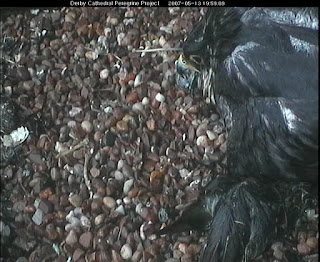 No doubt, everyone watching the web cam this afternoon will be concerned about the chicks welfare as the brooding bird becomes wetter and wetter in this heavy and persistent rain which is blowing straight at the East face of the tower, where the platform is situated.
No doubt, everyone watching the web cam this afternoon will be concerned about the chicks welfare as the brooding bird becomes wetter and wetter in this heavy and persistent rain which is blowing straight at the East face of the tower, where the platform is situated.Peregrines traditionally live and nest in very exposed mountain and sea cliff habitats and are use to getting wet as well as brooding chicks in heavy rain...though they obviously don't like it any more than we do! For now, we can only keep our fingers crossed....
The platform has many drainage holes and these were checked in February when the gravel was renewed, so we trust there will not be any build-up of water beneath the chicks.
It will be interesting to see if the parents attempt to feed the chicks while this rain persists. No doubt they have stashed some drier prey somewhere on the tower in case of weather like today's when hunting is presumably out of the question. Attempting a feed might not be a wise move right now......
Identification of the sodden corpse that is partially lying under the brooding bird is problematic but if you think you can identify it, please add a comment to this blog entry. (Subsequent comments suggest a thrush - thanks for that).
Postscript: At about 18.50pm the rain stopped and a feed took place. Two dry-looking chicks were seen begging for food. So all's well though I guess we must abandon hope that the two remaining eggs will hatch.
The brooding falcon still looks incredibly wet now that she has settled back on the chicks....it will be a long, uncomfortable night for her!

11 comments:
The prey was delivered by the male at 10:45. It appeared to be another Thrush. He fed the chicks after the female departed.
Hi We saw dad bring the dead bird to mum earlier today and it looked similar to a thrush we have also seen mum feed the babies a couple of times today, yes they did get wet but seemed to cope ok. This is an amazing thing to see and a great science lesson for my children, thankyou
hi we saw dad bring mum what looked like a dead thrush earlier today, we can also confirm tat we saw mum feed the babies a couple of times today they did look wet but seemed to cope really well. This is the best science lesson my daughter has had in a long time, thankyou
Blackbird?
It looks a bit like a swallow to me, by the look of the wing tips and two long tail feathers
wow they are wet!!!!! i hop the chicks are nice and dry they are so cute!!!!
I notice the peregrines in Ohio have a roofed nest box, could or would it not be an idea to have put one on Derbys birds nesting box? i know they dont have roofed homes in the wild, but with the concern of how wet she had become in yesterday's heavy rain,may be it would be a good idea?
We decided in 2006 that a roof was not needed. As you say, peregrines get wet in the wild; they are adapted to survive in these conditions - indeed, in far, far worse.
I speak from experience when I say that the nest box is in a very sheltered location on the east face of the tower. I've been up there on windy days when it's bitterly windy on top of the tower, but lower down on the face it really is quite sheltered. Our prevailing winds are from the south-west, not the east, so last weekend's weather was fairly atypical, and was short-lived.
A box with a roof can also end up being used by other less critical species. In Holland they have had both kestrels and ducks using their peregrine boxes.
Thank you for your concern though.
With the 2 eggs that hasn't hatched can you not remove them wont this stress the mother/father bird if there still there with out hatching. Ive been keeping a watch all day and most nights progress looking good.
Eggs failing to hatching out is a natural occurrence in the bird world. We must be so careful not to place our human emotions onto these magnificent creatures. They will not be "stressed" in any way by the failure of two out of four eggs. Or indeed if all the eggs had failed, as they did this year at one site in Ohio.
Disturbance of a peregrine nest in the UK is a very serious criminal offence without a licence, so disturbance just to remove an egg would be highly inappropriate. However, we do plan to get the chicks ringed by licenced experts later this month, if we can.
If they haven't been trampled to bits by then, and if the licence allows it, the addled eggs could be considered for removal for study at that time. But there is no need whatsoever for us to abseil down to remove a failed egg on the grounds of avoiding stress. There would be a policeman and court action awaiting us at the bottom!
Im watching these from the office facing the East side of the Cathedral. When the father bird was thee we got some binoculars and could see the father falcon, and at 15:13:24pm on 24-05-2007 we could see the mother bird sitting on the edge of the nest/box. :)
Post a Comment